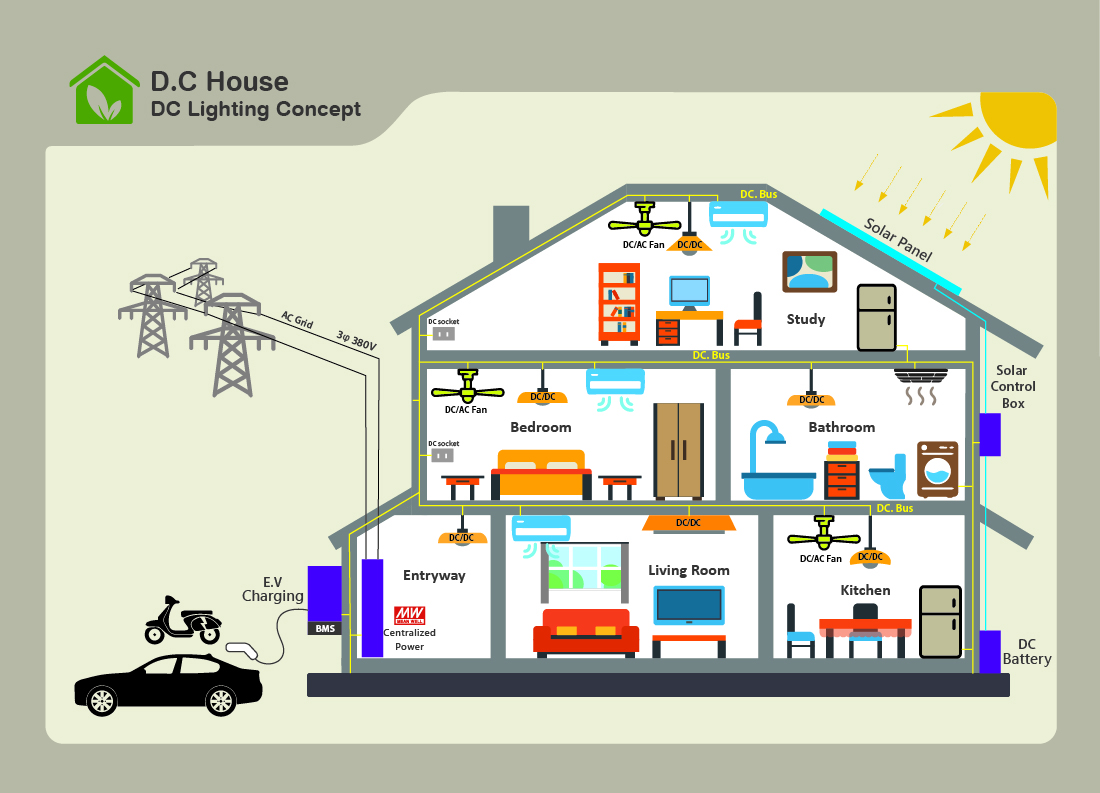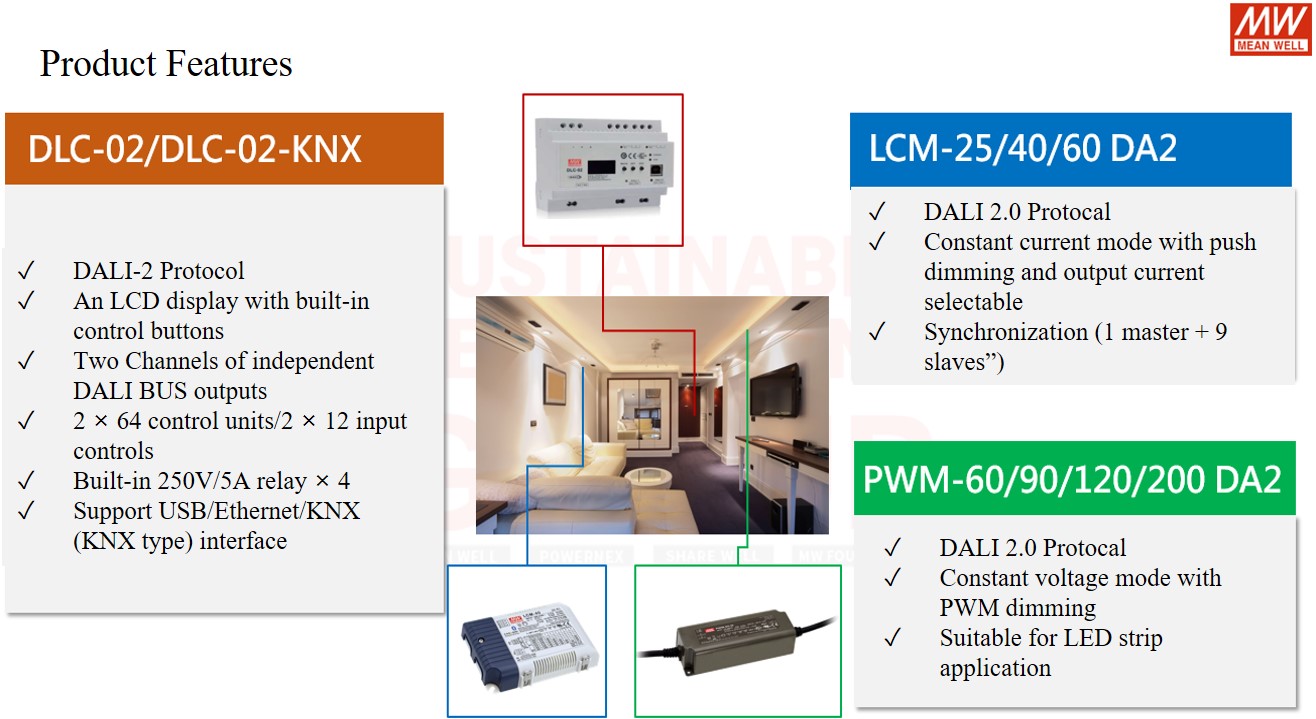Widespread use of electricity is recognized as a cause leading to the Second Industrial Revolution. At the same time, the battle between Nikola Tesla and Thomas Edison—inventors who designed the alternating current (AC) and direct current (DC) systems, respectively—remains a popular topic today. After AC has dominated our life for a few centuries, centralized DC power supply is likely to again move into the spotlight due to technological advances, dramatic changes in electricity use, and skyrocketing demand for energy storage.
As a leading provider of standard power supply solutions, MEAN WELL not only invests substantial resources in research and product development every year but has never stopped planning for the future. That is why MEAN WELL became the first to launch integrated DC power supply products for
LED lighting.
“We believe that DC power supply will be dominant in the future,” said Rex Lin, Product Manager of MEAN WELL’s Product Strategy Center, during the exclusive interview by LEDinside. Concerning the existing power supply applications today, nearly all electronic products adopt the AC/DC design. However, an AC/DC conversion incurs approximately 3%–10% of energy loss, causing products to heat up. Additionally, AC cannot be directly stored and must thus be converted again during energy storage, leading to further conversion losses.
MEAN WELL then asked, “Now that electronic components and technologies use DC approaches, which are mature, why not just switch to DC/DC conversion to reduce conversion losses? This method can also be adapted to demand energy storage in the future.”
Unlike the AC power supply where AC/DC conversion required more energy consumption, the DC/DC process of centralized power supply incurs lower losses, only between 2% to 6%. The design of a DC power system is relatively simple, suggesting a lower installation cost, reduced size, and enhanced reliability, all of which are conducive to subsequent operational maintenance. For example, compared with its AC counterpart, a DC power system—when being used to build a data center—helps reduce the conversion loss by at least 10% and the installation cost by 15%.
In addition to B2B market, MEAN WELL illustrates how centralized DC power supply can reshape future household electricity use by proposing its DC House concept. A shift toward centralized DC power supply of household appliances—including lamps, TVs, refrigerators, washing machines, air conditioners, rice cookers, coffee machines and even the electric car charger (potentially a common household item in future)—not only helps reduce conversion losses but can effectively lower peak demand (e.g., off working hours where most of electric cars are being charged at home) after being incorporated with storage systems, thereby reducing the risk of electricity shortages.
DC House is a concept proposed by MEAN WELL that illustrates the DC power supply for a home’s electrical system
Although centralized DC power supply is still new to the market, MEAN WELL has taken the initiative to release a 48V/380V DC LED driver, which is then used in its clients’ DC light fixtures and considered a pioneer of centralized DC products. By providing the LED driver, MEAN WELL attempts to enable customers to recognize the centralized DC power supply improvement.
Additionally, MEAN WELL holds that the development of lighting product digitization is promising, of which the demand will increase with the development of smart buildings. Therefore, the company has actively launched various DALI-2-certified power supplies for digital lighting.
Why do all power supply providers regard the DALI-2-certified product as a primary strategic development goal in the digital lighting market? DALI Alliance proposed the DALI-2 certification program as a standard for digital lighting control. Based on IEC 62386 (an international standard published by the International Electrotechnical Commission), the DALI regulations are developed with additional standards of various digital lighting control functions. Compared with version 1, the DALI version 2 is added with the definition and functions of input and output devices. The DALI-2 regulations enable LED lighting products to achieve digital lighting with a simple design, open system, and high level of compatibility.
Mr. Lin suggested that the DALI certification has become a mainstream standard in numerous markets such as Europe and Southeast Asia. Customers also consider the DALI certification a verification standard of product functions. Lin continued, “Lots of customers don’t want to buy products without the DALI logo.” In practice, installing a digital lighting system is simple to clients, which helps increase their acceptance of and willingness to adopt such system.
MEAN WELL has never lagged in developing products complying with the DALI-2 specifications and is a leading company with more complete production lines than other competitors. In 2020 and 2021, the power supply manufacturer has launched a series of LCM/PWM-DA2 LED drivers with DALI-2 certification. Moreover, after the DLC-02 DALI-2 controller, which will be available later this year, is launched, MEAN WELL will offer a complete digital lighting system and reveal the determination to enter the digital lighting market.
MEAN WELL has released complete series of products with DALI-2 certification
Indeed, growth in the lighting market has been affected by the COVID-19 pandemic in these two years, but MEAN WELL resiliently focuses on developing new applications, new technologies, and new products related to centralized DC power supply and digital lighting. Thus, the business has managed to maintain its leading position and competitiveness despite all the difficulties.













